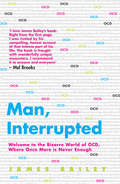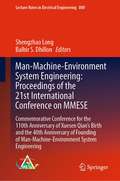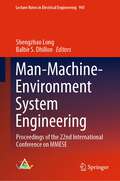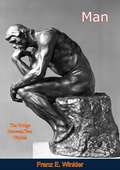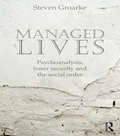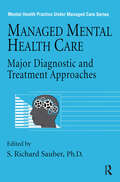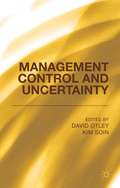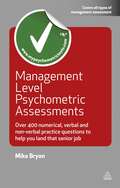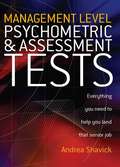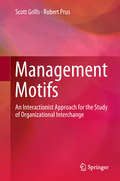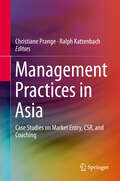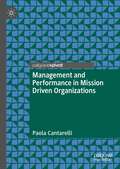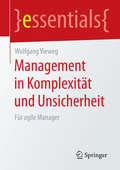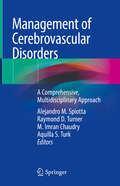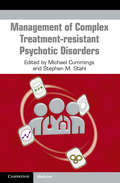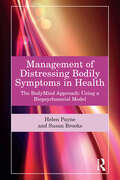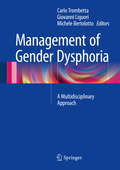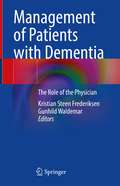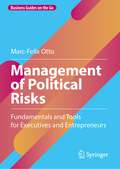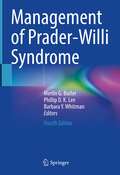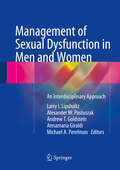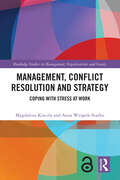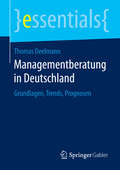- Table View
- List View
Man, Interrupted: Welcome to the Bizarre World of OCD, Where Once More is Never Enough
by James BaileyJames Bailey's form of obsessive-compulsive disorder (OCD) was as bizarre as it was unbearable. He was obsessed by a fear of drugs and their effects, believing himself to be in constant danger of becoming insanely high through people spiking his food, or even by just touching a photograph of a marijuana leaf.The treatment programme he went through at a specialist American clinic was challenging, to say the least. He was asked to shake hands and mingle with the local junkies, fighting his anxieties and the urge to go and wash for as long as possible in order to 'expose' himself to his fears.Man, Interrupted gives us a glimpse into the tortured world of a man suffering from what is an increasingly common disorder. But far from being a doom-laden account of mental illness, the result is uniquely revealing, hilariously entertaining and wonderfully rewarding.
Man-Machine-Environment System Engineering: Commemorative Conference for the 110th Anniversary of Xuesen Qian’s Birth and the 40th Anniversary of Founding of Man-Machine-Environment System Engineering (Lecture Notes in Electrical Engineering #800)
by Balbir S. Dhillon Shengzhao LongMan-Machine-Environment System Engineering: Proceedings of the 21st Conference on MMESE is the academic showcase of best research papers selected from more than 500 submissions each year. From this book reader will learn the best research topics and the latest development trend in MMESE design theory and other human-centered system application.MMESE focus mainly on the relationship between Man, Machine and Environment. It studies the optimum combination of man-machine-environment systems. In the system, the Man means the working people as the subject in the workplace (e.g. operator, decision-maker); the Machine means the general name of any object controlled by the Man (including tool, Machinery, Computer, system and technology), the Environment means the specially working conditions under which Man and Machine occupy together(e.g. temperature, noise, vibration, hazardous gases etc.). The three goals of the optimization of the system are safety, efficiency and economy.In 1981 with direct support from one of the greatest modern Chinese scientists, Qian Xuesen, Man-Machine-Environment System Engineering (MMESE), the integrated and advanced science research topic was established in China by Professor Shengzhao Long. In the letter to Shengzhao Long, in October 22nd, 1993, Qian Xuesen wrote: “You have created a very important modern science subject and technology in China!”.
Man-Machine-Environment System Engineering: Proceedings of the 22nd International Conference on MMESE (Lecture Notes in Electrical Engineering #941)
by Balbir S. Dhillon Shengzhao LongMan-Machine-Environment System Engineering: Proceedings of the 22nd Conference on MMESE are an academic showcase of the best papers selected from more than 500 submissions, introducing readers to the top research topics and the latest developmental trends in the theory and application of MMESE. This proceedings are interdisciplinary studies on the concepts and methods of physiology, psychology, system engineering, computer science, environment science, management, education, and other related disciplines. Researchers and professionals who study an interdisciplinary subject crossing above disciplines or researchers on MMESE subject will be mainly benefited from this proceedingsMMESE primarily focuses on the relationship between Man, Machine and Environment, studying the optimum combination of man-machine-environment systems. In this system, “Man” refers to working people as the subject in the workplace (e.g. operators, decision-makers); “Machine” is the general name for any object controlled by Man (including tools, machinery, computers, systems and technologies), and “Environment” describes the specific working conditions under which Man and Machine interact (e.g. temperature, noise, vibration, hazardous gases etc.). The three goals of optimization of the man-machine-environment systems are to ensure safety, efficiency and economy. The integrated and advanced science research topic Man-Machine-Environment System Engineering (MMESE) was first established in China by Professor Shengzhao Long in 1981, with direct support from one of the greatest modern Chinese scientists, Xuesen Qian. In a letter to Shengzhao Long from October 22nd, 1993, Xuesen Qian wrote: “You have created a very important modern science and technology in China!”
Man: The Bridge Between Two Worlds
by Franz E. WinklerAustrian-born author Dr. Franz E. Winkler was a follower of Dr. Rudolph Steiner, Austrian founder of anthroposophy, a spiritual philosophy of man.In Man: The Bridge between Two Worlds, which was first published in 1960, Dr. Winkler applied anthroposophical concepts to the problems of our time. The book became a great success and was subsequently translated into German, Dutch and Russian.“...a stirring of the life that glows in the deepest recesses of his reader’s consciousness.” — Barry Bingham, Louisville Courier-Journal, 1960“Winkler points out things science has tended to ignore: the power of ideas, the reality of man’s inner world.” — Stanton Coblentz, Los Angeles Times, 1960
Manage Your Mood: How To Use
by Rob Willson David VealeOvercoming app now available via iTunes and the Google Play Store.Depression is one of the most common mental health problems and affects 121 million people at any time.It is recognised by the World Health Organisation as one of the Top 10 most disabling health conditions. Behavioural Activation, a therapy developed from CBT, is an effective new technique in managing depression and ideally suited to self-help. By analysing, challenging and changing behaviours such as avoidance, ruminating and excessive worrying, the sufferer can gradually reinforce their positive experiences and decrease the behaviour which reinforces their depression. Includes worksheets and practical problem-solving techniques.Step-by-step approach to analysing and changing behaviours.Includes an explanation of depression and associated behaviours and case studies.Written by leading clinicians in the field.
Managed Lives: Psychoanalysis and the Administrative Task
by Steven GroarkeAn inherent tension exists in the history of psychoanalysis and its applications between the concepts of freedom and security. In Managed Lives, this tension is explored from the point of view of therapeutic experience. Set against the background of Freud’s contested legacy, the book examines ways of managing oneself under psychiatric supervision, in the analytic encounter and in the emotional and moral contexts of everyday life. Through a series of detailed case studies Steven Groarke addresses therapeutic experience as a formation of managed society, examining the work of Donald Winnicott on types of management, Colin Murray Parkes on bereavement and Anthony Giddens on the sociological appropriation of psychoanalysis. Managed Lives forms an original critical analysis of contemporary managerial culture and its self-reflexive project as well as presenting the idea of management as a source of inner security and vital morality. Presented in three parts, the book addresses: The Criterion of Maturity The Reflexive Norm The Managed Society Together, the book’s arguments provide a fresh and challenging perspective on post-Freudian uses of faith, the risks of critical rationality and the difficulties of living an ethical life under modern conditions. Managed Lives is ideal for academics and research students working on psychoanalytic studies, social theory and mental health studies as well as students and trainees taking courses in psychotherapy, counselling, social work and health and social care.
Managed Mental Health Care: Major Diagnostic And Treatment Approaches (Mental Health Practice Under Managed Care Ser. #No. 8)
by S. Richard SauberPublished in 1997, Managed Mental health Care is a valuable contribution to the field of Psychiatry/Clinical Psychology.
Management Control And Uncertainty
by David Otley Kim SoinManagement Control and Uncertainty recognizes that all control takes place under conditions of uncertainty: it does now, and it always has done. In this edited collection, the contributing authors examine different aspects of management control systems in the modern world whilst paying more explicit attention to the ubiquitous nature of uncertainty
Management Level Psychometric Assessments
by Mike BryonWith intense competition for top management jobs and increased pressure on organizations to select the best candidates, more and more firms are now using challenging psychometric tests as part of their recruitment and assessment procedures. Also used to identify management potential in existing staff, tests are increasingly used to select the weakest employees when job cuts beckon. Management Level Psychometric Assessments offers more types of assessment than any other management testing book. Ideal for managers applying for supervisory roles or jobs on the board, for promotions as well as new employment, it includes tests on quantitive reasoning, currency conversion, verbal reasoning, decision analysis, situational awareness and visual estimation. Along with detailed answers and explanations, it places particular emphasis on getting you test-ready, with advice on the presentation part of your assessment and crucial information on which tests you are most likely to face for your industry. Management Level Psychometric Assessments is an invaluable resource providing all the practice you need to pass those tests and succeed against the competition.
Management Level Psychometric and Assessment Tests: Everything You Need To Know To Help You Land That Senior Job
by Andrea ShavickGone are the days when an impressive CV and a sparkling performance at interview were all you needed to land a great job. Now, for the vast majority of medium-large sized organisations worldwide, rigorous assessment of candidates is an integral part of the recruitment process, especially when it comes to filling those elusive top jobs. So whether you're after a junior management, senior management or even director level position, or simply want to familiarise yourself with the very latest selection and recruitment techniques, you need this book! It includes: 37 genuine management-level practice psychometric tests from SHL Group plc, the biggest test publisher in the world including 360 questions covering verbal reasoning, numerical reasoning and abstract reasoning; everything you need to know about personality questionnaires, plus loads of practice material, including the popular OPQ 32 personality questionnaire; a complete guide to what to expect, and how to survive an assessment centre visit, alongside genuine Brainstorm, Scenarios and Fastrack management tests; and detailed information about the management-level 'behavioural simulations' such as role-plays, group discussions, business analysis, in-tray exercises and presentations, commonly used to assess candidates at assessment centres.
Management Level Psychometric and Assessment Tests: Everything You Need to Help You Land That Senior Job
by Andrea ShavickGone are the days when an impressive CV and a sparkling performance at interview were all you needed to land a great job. Now, for the vast majority of medium-large sized organisations worldwide, rigorous assessment of candidates is an integral part of the recruitment process, especially when it comes to filling those elusive top jobs. So whether you're after a junior management, senior management or even director level position, or simply want to familiarise yourself with the very latest selection and recruitment techniques, you need this book! It includes: 37 genuine management-level practice psychometric tests from SHL Group plc, the biggest test publisher in the world including 360 questions covering verbal reasoning, numerical reasoning and abstract reasoning; everything you need to know about personality questionnaires, plus loads of practice material, including the popular OPQ 32 personality questionnaire; a complete guide to what to expect, and how to survive an assessment centre visit, alongside genuine Brainstorm, Scenarios and Fastrack management tests; and detailed information about the management-level 'behavioural simulations' such as role-plays, group discussions, business analysis, in-tray exercises and presentations, commonly used to assess candidates at assessment centres.
Management Motifs: An Interactionist Approach for the Study of Organizational Interchange
by Robert Prus Scott GrillsThis book examines management and management-related activities as a feature of everyday life. Any person or group that attempts to influence or shape the behaviors or experiences of others may be understood as engaging in management activities. The study of management involves the study of achieving understanding, providing direction and coordinating activities with others across an endless array of humanly engaged terrains. Management Motifs provides a research agenda for an interactionist approach to the study of management activities. Moving well beyond more organizationally-based understandings of managers and management, it examines the pragmatic accomplishment of management activities and the generic social processes that accompany them. This work addresses diverse issues related to management such as: holding and doing office, pursuing cooperation, developing policy, envisioning and advocating for missions, establishing teams and generating team identities, sustaining team endeavors and managing self. By attending to management-related concerns as a generic feature of human group life, the authors develop and articulate a research framework for the study of managing and management.
Management Practices in Asia: Case Studies on Market Entry, CSR, and Coaching
by Christiane Prange Ralph KattenbachAsia is a continent of contradictions and boundaries; it offers exciting business opportunities, but is also characterized by unpredictability and conflict. While flexibility and creativity are in the DNA of many startups in China, major players like Xiaomi and Alibaba have also emerged as global giants, challenging established global competitors. The authors of this book show that these companies are crossing various boundaries – between cultures, mindsets, and perspectives. At the same time, Western companies entering Asian markets face challenges that are very different from those on their home turf. This book addresses the needs of current and future managers doing business in Asia, who need to understand the individual, social and business challenges that can arise from crossing boundaries. The respective case studies provide essential insights on how several Asian companies have made impressive strides towards becoming established players; how the revival of local brands and growing pride in local products has become a major challenge for global competition; how the need to actively practice corporate social responsibility in Asian markets is currently challenging many companies; and how the need for individual and team coaching among the members of management to support a company’s development has grown tremendously, calling for new solutions.
Management and Performance in Mission Driven Organizations
by Paola CantarelliManagement scholars worldwide increasingly capitalize on theoretical models and research designs from the behavioural sciences to close the implementation gap in mission-driven organisations. This book aims at synthesising the theoretical frameworks and evidence that has flourished over the past decades in order to advance the scholarly debate and the implications for practice in the domains of performance management, information systems, investments strategies, people administration, and change and innovation. It provides meaningful insights to tackle real-world challenges that organizations and their managers face on a daily basis; including why two managers can make radically different decisions in front of the same information, which cognitive traps most often get in the way of good performance management, and how managerial interventions can limit such errors and variability.
Management in Komplexität und Unsicherheit: Für agile Manager (essentials)
by Wolfgang ViewegWolfgang Vieweg behandelt die Frage, wie Management in komplexer, volatiler und unsicherer Umgebung nachhaltig erfolgreich sein kann. Warum versagen die herkömmlichen Ansätze? Und was konkret sichert zukünftigen Erfolg? Zwischen ,,kompliziert" und ,,komplex" liegen Welten: Heutiges Management, das dazu neigt, alles auszureizen, alles auf die Spitze zu treiben, steht vor einem fundamentalen Wandel. Erst eine neue Herangehensweise an die Welt, neue Konstrukte und neue agile Methoden gestatten es, mit Komplexität artgerecht und nutzbringend umzugehen.
Management of Cerebrovascular Disorders: A Comprehensive, Multidisciplinary Approach
by Alejandro M. Spiotta Raymond D. Turner M. Imran Chaudry Aquilla S. TurkThis important title brings together a distinguished panel of thought-leaders, known for their insights into the development and application of minimally-invasive surgical and endovascular techniques, to provide a comprehensive and discerning compendium of our most current knowledge and state-of-the-art procedures in the management of cerebral vascular diseases. Written in a style that is accessible to students and experienced practitioners alike, the book covers all the important recent advances that have reshaped the field in dramatic ways. Emphasizing how surgical and endovascular techniques are complementary, the volume includes illuminating chapters on the nexus of endovascular and conventional “open” cerebrovascular surgery, including patient assessment and practice in a hybrid operating environment, utilizing the best methods to achieve optimal outcomes. A major addition to the clinical literature, Management of Cerebrovascular Disorders: A Comprehensive, Multidisciplinary Approach will be of significant interest to neurosurgeons, neurologists, neuroradiologists, neurointensivists, students, residents, fellows, and specialized attending physicians.
Management of Complex Treatment-resistant Psychotic Disorders
by Cummings, Michael A. Dr. Stahl, Stephen M. Dr.This full-color, practical handbook provides a concise, evidence-based psychopharmacological approach to the management of complex treatment-resistant psychotic disorders. Part I focuses uniquely on topics and strategies relevant to treating this challenging patient population. These approaches go beyond standard guidelines while adhering to research and clinically derived data. Part II provides a concise array of information regarding those classes of medications most commonly used when treating complex treatment-resistant psychotic disorders. Each medication guide contains sections including mechanisms of action, typical treatment response, monitoring, dosing and kinetics, medications to avoid in combination/warnings, and take-home pearls. Part III offers tips in brief appendix chapters for managing common issues ranging from loading lithium and valproic acid to the treatment of acute psychomotor agitation. An essential resource for psychiatrists, forensic clinicians, psychiatric trainees, and all mental health professionals involved with, or interested in, the treatment of challenging psychotic disorders.
Management of Distressing Bodily Symptoms in Health: The BodyMind Approach using a Biopsychosocial Model
by Helen Payne Susan BrooksSomatisation or medically unexplained symptoms (MUS) are distressing bodily symptoms for which tests and scans return normal. They can be incredibly debilitating conditions and people seek health care frequently due to their distress. They are common worldwide – yet there are few interventions available to help those suffering with the physical and emotional pain they cause. This book presents a solution to this problem by providing a comprehensive introduction to The BodyMind Approach (TBMA), developed by Helen Payne, and outlines guidance on applying TBMA principles to facilitated groupwork with patients/clients.Readers will learn how TBMA’s biopsychosocial learning model can be used to support patients in their self-management of anxiety associated with body distress disorder, as well as their accompanying bodily felt experience. Chapters explore: Adult learning theories and The BodyMind Approach An overview of medically unexplained symptoms/body distress disorder The BodyMind Approach The BodyMind Approach Programme Training of The BodyMind Approach facilitators Qualitative research on The BodyMind Approach Somatisation and adult attachment theory The BodyMind Approach to support students in Higher Education Somatisation, The BodyMind Approach and chronic stress This unique book is essential reading for healthcare professionals and mental health practitioners as well as those who are, or wish to train, as a TBMA facilitator. It will also be a compelling read for a variety of other professions, including, but not limited to, dance movement psychotherapists, art psychotherapists, counsellors, health coaches, clinical psychologists, GPs, pain clinic staff and nurses.
Management of Gender Dysphoria
by Carlo Trombetta Giovanni Liguori Michele BertolottoThis book is especially focused on the surgical aspect on Gender Dysphoria. Male to female surgery is widely discussed as well as the female to male conversion. Full information on hormone administration and surgical procedures are provided. Mental health issues are also described, as well as ethics, the law and psychosocial issues. The text is extensively referenced and includes numerous photos, tables and figures to clearly illustrate information. Based on collaboration between international experts in transgender health, this book is an essential guide for health care professionals, educators, students, patients and patients' families concerning the psychological, hormonal, surgical and social support of transgender individuals.
Management of Patients with Dementia: The Role of the Physician
by Gunhild Waldemar Kristian Steen FrederiksenThis book provides an overall introduction to the medical management of dementia with chapters dedicated to specific topics such as pain, epilepsy, vascular risk factors in dementia and review of medication, which are often not addressed in books on the subject, and thereby filling a gap in the field. Chapters are supplemented with cases to highlight key concepts and treatment approaches, and to provide the reader with the possibility to reflect on management options and the readers´ own current practice.This book is aimed at clinicians of different specialties (mainly neurology, psychiatry, geriatric medicine and general practice/family medicine) who manage patients with dementia on a regular basis, and thus provides useful guidance to be used in the clinic.
Management of Political Risks: Fundamentals and Tools for Executives and Entrepreneurs (Business Guides on the Go)
by Marc-Felix OttoPolitical risks are on the rise. The recent past has been characterized by a dominance of geopolitical risks, which have the potential to endanger companies, entire sectors, and even national economies. Furthermore, the expanding regulatory framework, growing national debt, and other factors contribute to the escalation of political risks. The book offers a comprehensive and proven approach to identify and manage such risks. In addition to avoiding and mitigating risks, there is an opportunity to cultivate competitive advantages in navigating these challenges. Throughout the book, three fictional companies—a chemical corporation, an electricity producer, and a commodity trader—accompany the reader and demonstrate how the provided tools can be applied in practical scenarios.
Management of Prader-Willi Syndrome
by Phillip D. K. Lee Barbara Y. Whitman Merlin G. ButlerNow in a fully revised and updated fourth edition, this book remains the most comprehensive resource on Prader-Willi syndrome (PWS) available on the market. There have been significant changes in the diagnosis, clinical care and treatment of PWS since the previous edition was published in 2006, and more thorough information on understanding the cause and diagnosis of the condition, along with clinical presentation and findings with natural history data now available. The book is divided into three thematic sections. Part One discusses the genetics, diagnosis, research and overview of PWS, including current laboratory testing. The medical physiology and treatment of PWS comprise Part Two, covering the GI system, obesity as well as the use of growth hormone. Part Three, the largest section, presents a wide-ranging, multidisciplinary management approach to PWS, attending to the many manifestations of the condition. Topics here include neurodevelopmental aspects, speech and language disorders, motor issues, psychological and behavioral management, educational and transitional considerations, vocational training and residential care, and advocacy for both school discipline and sexuality. Syndrome-specific growth charts, benefits eligibility information and additional resources are included in helpful appendices. Timely and well-crafted, this latest edition of Management of Prader-Willi Syndrome remains the gold standard for clinicians and health care providers working with patients diagnosed with this rare obesity-related genetic disorder.
Management of Sexual Dysfunction in Men and Women
by Larry I. Lipshultz Alexander W. Pastuszak Andrew T. Goldstein Annamaria Giraldi Michael A. PerelmanThis book provides a comprehensive, state-of-the art review of the intersection of male and female reproductive and sexual health. The text comprehensively discusses the evaluation and management of physical, genetic, and psychological causes of male and female sexual dysfunction. Discussion of treatment focuses on current medical and surgical psychosexual therapies in both the male and female. The book highlights erectile, ejaculatory, and orgasmic disorders in the ma≤ desire, arousal and orgasmic disorders in the fema≤ and an integrated approach to the couple. Lifestyle modifications through diet and exercise and optimization of anthropomorphic characteristics are also discussed, including a holistic approach to these disorders that goes beyond a focus on the genital system alone. Sexual Dysfunction in Men and Women: An Interdisciplinary Approach serves as a resource for physicians and researchers interested in sexual medicine seeking a comprehensive overview of the practice and novel research in the field.
Management, Conflict Resolution and Strategy: Coping with Stress at Work (Routledge Studies in Management, Organizations and Society)
by Anna Wziątek-Staśko Magdalena KraczlaManagers are key people in building the success of any organization. Business results depend on their efficiency in the implementation of the power entrusted to them. This efficiency, on the other hand, largely depends on psychosocial competences and personality predispositions. One of the main factors affecting destructively on managers is stress, destroying the level of their motivation to work, the level of commitment and ultimately resulting in premature professional burnout and a significant reduction in the level of efficiency. Ultimately, instead of efficient and motivated specialists, companies are struggling with employees suffering from depression. Exploration of the issue of identifying the sources of stress draws attention to conflict as one of the main research categories that are closely related to the category of stress. It is worth emphasizing that this relationship is two-way: conflict determines the level of stress, stress may determine the scale of conflict situations. This recommended monograph provides the latest knowledge on what contemporary managers use conflict resolution styles and what strategies they choose to deal with in stressful situations. A particular advantage of the study is the presentation of the links between both research categories, which are so paramount nowadays.
Managementberatung in Deutschland: Grundlagen, Trends, Prognosen (essentials)
by Thomas DeelmannThomas Deelmann analysiert Treiber und Trends derManagementberatung in Deutschland. Diese gilt seit Jahren als eine derschillerndsten und attraktivsten Branchen im Wirtschaftsleben und wird sehr ambivalent betrachtet: Sie ist ein attraktiver Arbeitgeber und von Kunden stark nachgefragt, gleichzeitig wird aber auch regelmäßig Kritik geäußert. Vor diesem Hintergrund stellt der Autor elf Thesen zur Managementberatung in Deutschland vor. 14 Experten aus Beratungs- und Kundenunternehmen sowie Marktbeobachter beziehenim Rahmen einer zweistufigen Delphi-Studie hierzu Stellung. Ihre Einschätzungen bieten einen exzellenten Einblick in die Branche und deren voraussichtliche Entwicklung.
